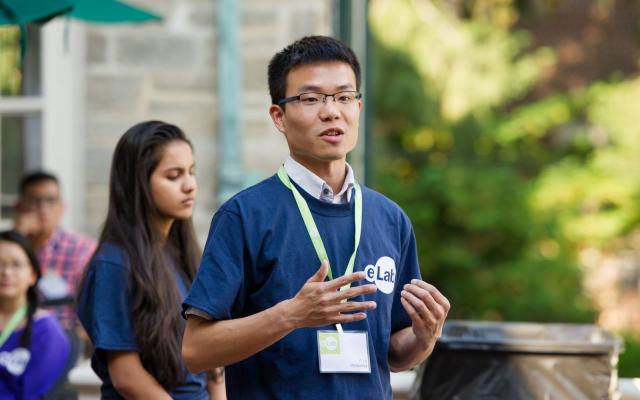
Original story by John Sullivan, Engineering Communications, on July 20, 2016
When he presented his team's medical imaging system at Princeton University's Innovation Forum in February, Jen-Tang Lu said it would transform the difficult task of ultrasound imaging into something as easy as snapping a selfie. The system, which uses machine learning and an online database to analyze anatomical structures, is designed to be faster and more accurate than current ultrasound techniques.
The technology impressed the judges, and the idea took the top prize. Now, Lu's team, Ultrasonyx, is joining the Keller Center's eLab summer business accelerator to help develop the technology into a thriving business.
"We have a team strong in technology, from the advisor to the undergraduate team members, but we don't have a lot of business experience," said Lu, a fifth-year graduate student in electrical engineering. "The Keller Center can provide resources and excellent mentors to help us develop a business strategy."
Working with Jason Fleischer, an associate professor of electrical engineering, Lu said the team is already conducting interviews with physicians and ultrasound manufacturers about ways to adapt the technology.
"We would like to find a strategic partner, a leading ultrasound manufacturer," he said. "We could license or provide the technology to help them improve their imaging quality. At the same time, they could help us with our database; that would help us further develop the technology."
Ultrasonyx is among eight teams eLab this summer. The other teams include an effort to bring intelligent robotic systems to the "internet of things," an online class for American Sign Language and a way for students to improve their experience at university hackathons.
"We are excited to welcome eight exceptional teams into the 2016 class," said Cornelia Huellstrunk, the Keller Center's executive director. "While most of the students come from Princeton University, the eLab has also opened its doors to students from other universities who have joined forces with Princeton entrepreneurs."
This year's teams include:
Ads on Top
The team is building a new buying platform for digital, out-of-home advertising (billboards, bus shelters, subways, taxis, etc.), and showcasing this on custom-made screens for the roofs of rideshare vehicles.
Cartful
Cartful is a fashion-discovery engine that focuses on making new, up-and-coming brands accessible. The team's mission is to highlight these brands as a worthy alternative to big-box retailers by allowing users to easily discover and shop these brands based on their personalized preferences.
HackerPack
The HackerPack team is creating an open-sourced guide to hackathons, events that bring together students to invent new software and hardware from scratch during an intensive few days. The goal of the guide is to enhance the experience of new and veteran participants in hackathons. The online system collects new technologies and presents step-by-step guides and uses surveys to rank projects and approaches. The program also creates a community of hackathon enthusiasts.
Hubble (formerly Proximate)
Hubble is a social app that connects friends on college campuses based on their locations. Users' locations on campus are shared with friends using a map in the Hubble app. Users can also search for their friends on campus and are notified when their friends check into the app.
Robolution
The team intends to bridge the gap between specialized industrial robotics and high-technology general robots by creating intelligent systems for everyday devices. Their robots would become part of the "internet of things," an extension of the internet in which appliances and other objects share information with each other. The team is building task-oriented intelligent systems for activities such as cooking as a way to introduce robotics into daily life.
SignSchool
The team is presenting an online learning platform for American Sign Language that uses a combination of interactive exercises and learning games. The modular system provides a free way for users to learn basic signs and conversational phrases relevant to their immediate needs.
Thrive+
The team develops consumer-product items intended to alleviate common maladies. One product aims to improve hydration and another to mitigate the negative effects of alcohol.
Ultrasonyx
Current ultrasound imaging relies on trained technicians to operate machinery and evaluate images. Ultrasonyx simplifies the image-taking process and enhances image quality via advanced imaging techniques and a proprietary database for accurate diagnosis and treatment.